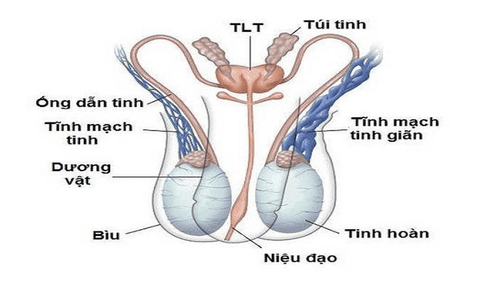This is an automatically translated article.
Currently, infertility due to male causes accounts for 40% of infertility causes. Among them, azoospermia or azoospermia is one of the most common causes.
1. What is the AZF Zone?
The AZF region stands for Azoospermia factor, which is the AZF region on the long arm of the Y chromosome. This region is home to many genes that are important in controlling normal spermatogenesis in men.
If a segment is lost in the AZF region, spermatogenesis in men will be affected. Depending on the location of the loss, the effects caused also have different levels. In which azoospermia, severe oligospermia or abnormal sperm function are the most common cases.

Vùng AZF là nơi chứa nhiều gen quan trọng trong việc sinh tinh ở nam giới
2. Cases of loss of the AZF . region
Currently there are the following cases of loss of the AZF region:
Loss of the AZFa region
The AZFa region contains two gene fragments, USP9Y and DDX3Y, which play an important role in sperm production.
If a man loses the AZFa region gene, there will be no sperm in the semen. It also leads to simple Sertoli syndrome, this is a syndrome where there are no sperm in the testicles, only the cells involved in the process of helping sperm develop.
Loss of the AZFb region
The AZFb region, located next to the AZFa region, contains two gene fragments, RBMY and PRY, that also play a role in sperm production. But unlike the loss of the AZFa region, people who lose the AZFb region, the sperm cannot develop to mature, thereby leading to infertility. However, there are some cases where the AZFb region is lost and no sperm is present in the semen.
Loss of the AZFc region
Next to the AZFb region is the AZFc region, which contains overlapping gene fragments with AZFb. When the AZFc region is lost in men, the manifestations are reported to be very diverse. The patient may have no sperm in the semen or low sperm concentration, thereby leading to infertility.
In addition, there are other cases where loss of the combined AZF region occurs, the patient will lose the AZF region (a+b+c) or lose the AZF region (b+c).

Có 3 vùng AZF (a,b,c) nằm ở phần nhánh dài trên nhiễm sắc thể Y
3. Why test for AZF deletion on the Y chromosome?
The phenomenon of loss or reduction of fertility is very common today, with genetic and chromosomal causes accounting for 10-15% of male infertility cases. In which, up to 2% of cases were recorded as due to mutations in the deletion of the AZF region on the Y chromosome, causing disturbances in sperm cell development.
Deletion mutations in the AZF region will cause azoospermia or low sperm count. According to statistics, the deletion mutation in the AZF region on the Y chromosome is the second highest rate of genetic abnormality after Klinefelter syndrome in male infertility.
Therefore, the AZF deletion mutation test on the Y chromosome has a very important role in the diagnosis process and gives the appropriate treatment for the patient's condition.
4. What are AZF region deletion test results used for?
After the AZF deletion test results are available, the doctor will rely on that to make diagnoses about the following problems:
Determine the cause of male infertility, conclude that it is due to deletion mutations the AZF region on the Y chromosome. Used as a basis for genetic counseling and selection of appropriate treatment for patients. Provide detailed information about the patient's health condition to choose the right treatment for them. Because men who have lost the AZF segment, if they receive assisted reproduction to have children, all of their sons will carry the same mutation that loses the AZF segment as their fathers. Advise patients with azoospermia whether or not to undergo TESE procedure to obtain sperm from the testicles.

Bác sĩ sẽ dựa vào kết quả xét nghiệm để đưa ra chẩn đoán và hướng điều trị cho người bệnh
5. In what cases is the AZF deletion test indicated?
As we all know, the AZF test will be used to determine if the cause of infertility is due to the male. Therefore, in cases where the patient has fertility abnormalities, the doctor may prescribe this method. Specifically, the AZF deletion test will be indicated in the following cases:
Sperm density below 5 million/ml. Infertility is not due to obstruction. Before deciding to have varicocele surgery. Wife has a history of miscarriage or fetal malformation.
6. In which cases is the AZF deletion test contraindicated?
In addition to those indicated, the AZF test should also be considered before conducting for the following cases:
Abnormal karyotype. Infertility due to obstruction. Hypogonadotropic hypogonadism, which is hypogonadism in men due to low or no sex hormones in the testicles. The AZF deletion mutation on the Y chromosome is a serious and inherited disease, so testing for the AZF deletion mutation is absolutely necessary to determine the fertility of men and women. It is also the basis for patients to consider having children or not.
Reproductive Support Center - Vinmec International General Hospital gathers a team of leading experts in the field of Obstetrics and Gynecology, and Orthopedics, both domestically and internationally, and a team of doctors and nurses trained in leading countries. leading in the world in medicine such as the US, Singapore, Japan, Australia and world-renowned assisted reproductive centers. With a high level of expertise and extensive experience, the team of experts at Vinmec Fertility Center are capable of synchronously and comprehensively deploying today's most advanced assisted reproductive techniques, helping to realize fulfill the parenting dream of hundreds of families across Vietnam.
Customers can directly go to Vinmec Health system nationwide to visit or contact the hotline here for support.













